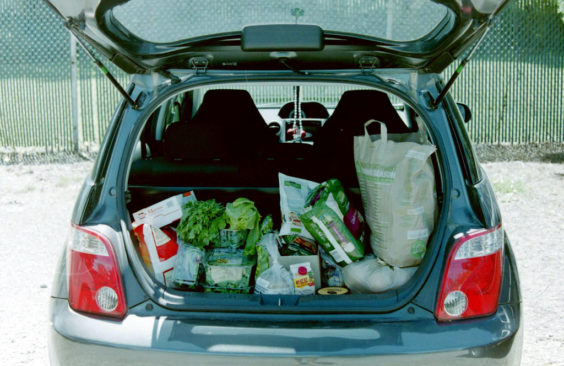If you drive past the grocery store closest to your home to shop at one further away, while people who live near your preferred grocery store drive to the one closest to your home instead – wouldn’t it be easier if we all just moved?
A new study says a surprising number of us bypass the grocery store most convenient to our home, in order to travel to a different one.
Is it because the other store has a better selection, lower prices, friendlier staff, more generous coupon policy? It’s certainly not because it’s more convenient than going to the one you drive past to get there.
The finding comes from a new USDA survey entitled “Where Do Americans Usually Shop for Food and How Do They Travel To Get There?” The goal of the study was to find out whether the poor are at a disadvantage when it comes to getting to a grocery store that offers healthy and affordable food.
But the researchers found something interesting in the course of conducting their survey. Whether rich or poor, whether they walk, drive, take public transportation or have to hitch a ride from a friend, the study found that “the average household bypasses the store that is nearest them and shops at a store that is farther away.”
On average, shoppers’ nearest supermarket or supercenter is just over 2 miles away from home. But the average distance they travel to their preferred store is nearly 4 miles. And the study found that’s true of shoppers of all income levels – they’re all just as likely to travel twice as far to get to the place they consider their primary store.
“Store proximity may be important, but clearly other store attributes — such as price, quality, and selection — affect where households do their primary food shopping,” the researchers conclude.
But which attribute is most important when choosing a place to buy your groceries? That’s something researchers have been trying to find out – and disagreeing about – for years.
“Distance elasticities have greater magnitudes than do price and assortment elasticities for all store chains,” the authors of a 2004 study on grocery store choice wrote. “This supports the conventional wisdom that convenience is the most important determinant of store choice.”
Yet the authors of a similar study in 2008 found that “respondents are mainly concerned with quality and price of merchandise, and that behavior is directly linked to derived utility measures. Of lesser importance to the decision-making process are: traveling distance, speed of service, and closeness to parking.”
Which study is correct, then? Well, the USDA findings would certainly appear to support the conclusion that convenience and closeness are not the main motivating factors when choosing a place to shop. If the store closest to you has a lousy selection or high prices, it’s probably worth it to drive somewhere else.
But if your closest grocery store has a great selection, low prices and friendly employees who just love taking your coupons, consider yourself lucky – it seems you’re in the minority. And if you have to travel more than four miles – above the national average – to get to your preferred store, have a look at the homes you pass along the way. Maybe relocating isn’t such a bad idea after all.















Two Walmarts are closer to me than the Publix where I like to do my grocery shopping. Id imagine many others are in a similar situation. Id travel ten times as far if it meant a store other than Walmart!!
I pass 2 Safeways to get to my favorite one, but sometimes go to the others. They’re not terrible. Maybe my favorite wouldn’t like me so much if I was always there. When I worked for SW in another upscale area (palo alto, menlo park,belmont), it was drilled into us that the only thing between us & the doors closing was being friendly & fast. But that didn’t jive with customer feedback. Some went to the expensive store for Status(snobbery)points, most shopped for quality and some-even there-wanted the best price.. Before that, I worked in a rural area with a depressed economy. Friendliness & knowing your checker had a much greater importance there.